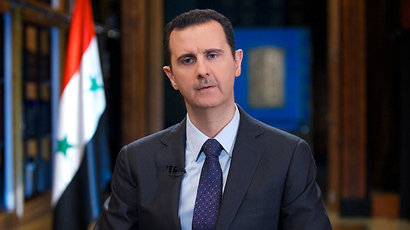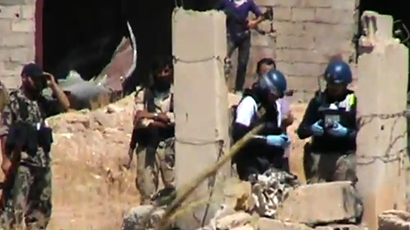No country can usurp right to judge chemical weapons use – Lavrov
Only a joint UN response can be productive in addressing the Syrian chemical weapons crisis, Russian Foreign Minister Sergey Lavrov has said. He denounced lobbying of the use of force by a certain group of countries as ineffective and extremely dangerous.
With the tragic situation in Syria and “ambiguous”
developments in the Middle East and Northern Africa on the whole,
there is an “urgent task to agree upon collective responses to
the key issues of today,” which is “solely within the
power of such a truly universal organization as the UN,”
Russian Foreign Minister stressed during his speech at the 68th
session of UN General Assembly on Friday.
Calling the use of chemical weapons by any party
“unacceptable,” Lavrov said that it “does not mean… one
can usurp the right to accuse and pass verdicts,” stressing
that all the related incidents in Syria “must be investigated
in a professional and unbiased manner and then examined by the UN
Security Council exclusively on the basis of facts, rather than
allegations and assumptions.”
The minister in particular noted a worrying tendency for using
the argument that the use of force could be “the most
effective method to address international problems, including
settlement of internal conflicts,” contrary to the UN
Charter.
Despite the fact that all the recent experience has proven that
military interventions are “ineffective, meaningless and
destructive,” there have been “attempts to extrapolate
such an approach also to the situation in Syria,” Lavrov
said.
According to the minister, “this is an extremely dangerous
path leading to the erosion of the foundations of today’s world
order and subversion of the WMD non-proliferation regimes.”
Lavrov has expressed hopes that a peace conference to implement
the Geneva Communiqué, commonly referred to as Geneva-2, will be
called as soon as possible, adding that Russia is “vigorously
working” on the matter.
“People continue to die and peaceful civilians suffer every
day in Syria. The religious minorities, including Christian
communities, are becoming victims of the conflict, which is
increasingly acquiring a sectarian character. Virtually the only
possibility today to put an end to this turmoil is to move from a
deadlock the process of political settlement of the Syrian
crisis,” Lavrov said.

Lavrov has criticized attempts to impose the opinion on
“legitimate” leaders of the MENA countries, saying that
the simplified vision of the situation in the region promoted by
certain states also obscures the problem of extremism.
“The desire to portray in a simplified way the developments in
the Arab World as the struggle of democracies against tyrannies
or the good against the evil has long obscured the problems
associated with the rising wave of extremism which spills over to
other regions today as well. The terrorist attacks in Kenya have
demonstrated all the gravity of this threat,” the minister
said.
While, according to Lavrov, it is “common knowledge” that
jihadist groups comprising of international extremists make up
the most combat-capable units of the Syrian opposition, the
minister said that the policy of fighting such groups in Mali and
supporting them in Syria at the same time “is hard to call as
far-sighted.”
The Syrian crisis should also not overshadow the task of solving
the Palestinian problem, Lavrov said. While recognizing the US
efforts in the Israeli-Palestinian settlement, the Russian
Foreign Minister said it is also necessary to intensify the
activity of the Quartet and to ensure a close involvement of the
Arab countries in the talks.
Negotiations are the only means possible in addressing the
situations around the Iranian nuclear program and the nuclear
problem of the Korean Peninsula, Lavrov stressed. Quoting Russian
President Vladimir Putin, the minister urged to “stop using
the language of force and return to the path of civilized
diplomatic and political settlement.”
This would help improve the international environment and foster
the collective efforts to counter global terrorism and drug
trafficking, Lavrov said. These two pressing challenges would be
top-priority tasks during Russia’s G8 presidency in 2014, he
added.














